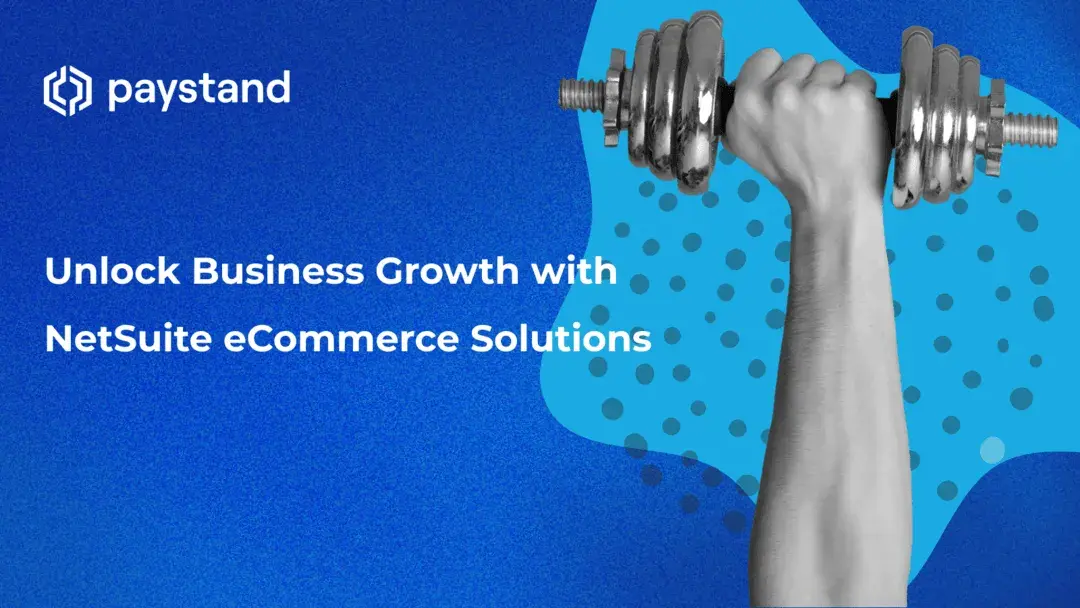Unlock Business Growth with NetSuite eCommerce Solutions

Table of Contents
- Does NetSuite do eCommerce?
- Does NetSuite have a Native B2B eCommerce Platform?
- NetSuite Add-Ons and Apps
- Challenges of Separate Systems vs. Integrated Solutions
- Enhance NetSuite's eCommerce Capabilities with Paystand
Key Takeaways
- NetSuite's eCommerce capabilities help businesses manage financials, inventory, pricing, payments, customer relationships, taxes, etc.
- NetSuite's eCommerce platform includes a website builder, order management, multi-channel selling, marketing and SEO tools, and CRM integration.
- NetSuite's SuiteCommerce platform offers a native B2B solution with complex pricing structures, robust order management, and seamless integration with NetSuite ERP.
- Integrating eCommerce platforms with NetSuite can improve operational efficiency, enhance customer service, and increase sales.
- SuiteCommerce allows B2B and B2C businesses to manage customer interactions, pricing, and orders through a unified system, eliminating the need for third-party integration.
NetSuite is one of the most powerful eCommerce platforms today, even more so than most standalone solutions. It can manage website data, sales, and payments and integrate with sites like Amazon, eBay, Walmart, and other eCommerce powerhouses.
NetSuite eCommerce integrations are a powerful tool for scaling businesses. They can help teams of all sizes manage financials, inventory, pricing, payments, customers, taxes, billing, vendors, and more. Their extensive infrastructure makes data flow efficiently through business processes easy.
Discover the countless advantages NetSuite integrations with other platforms have for your business. This article will explore these platforms and how best to ensure their growth and stability.
Does NetSuite do eCommerce?
Yes, NetSuite does offer eCommerce capabilities as part of its cloud-based business management software suite. NetSuite's eCommerce platform enables businesses to create and manage online stores, process orders, and integrate with various sales channels and marketplaces. Here are some key features and benefits of NetSuite's eCommerce solution:
-
Website Builder: NetSuite provides a user-friendly website builder with customizable templates and drag-and-drop features, enabling businesses to create online stores without coding expertise.
-
Order Management: NetSuite's eCommerce platform offers robust order management, including tracking, inventory management, shipping, tax calculation, and payment processing.
-
Multi-Channel Selling: NetSuite's eCommerce solution enables businesses to sell on multiple channels, manage inventory and orders, and sync product information.
-
Marketing and SEO: NetSuite provides integrated marketing and SEO tools to enhance online store visibility.
-
Customer Relationship Management (CRM): NetSuite's eCommerce platform integrates with its CRM, allowing businesses to manage customer relationships and personalize shopping experiences through interaction tracking, account management, and support.
-
Financial Management: NetSuite's eCommerce solution integrates with its financial management module, enabling businesses to monitor online sales revenue, expenses, and profitability. It offers tools for financial reporting, expense tracking, and revenue recognition.
-
Scalability and Reliability: NetSuite's eCommerce platform offers scalable and reliable cloud infrastructure for online stores to manage high traffic and maintain uptime during peak shopping periods.
What eCommerce Platforms Integrate with NetSuite?
If you are looking for an eCommerce platform that integrates with NetSuite, there are several options to consider. The best platform for you will depend on your specific needs and budget. However, all the platforms listed offer a wide range of features and integrations that can help you improve your operations and increase your sales.
Some of the most popular eCommerce platforms that integrate with NetSuite include:
- Shopify: A user-friendly eCommerce platform with product, inventory, and shipping management features.
- WooCommerce: A popular plugin that turns your WordPress site into an online store. It offers many features, like product and inventory management and payment processing.
- Magento: A powerful eCommerce platform that offers product and inventory management and CRM.
- BigCommerce: Cloud-based eCommerce platform that offers product, inventory, and shipping management.
- Salesforce Commerce Cloud: Cloud-based eCommerce platform that offers product and inventory management and CRM.
Benefits of integrating eCommerce platform with NetSuite
- Improved efficiency: Streamline operations, automate tasks, and focus on other business aspects.
- Better customer service: Enhance the shopping experience by providing real-time order tracking, accurate shipping information, and diverse payment options.
- Increased sales: Boosts sales by tracking performance, identifying trends, and targeting marketing effectively.
Does NetSuite have a Native B2B eCommerce Platform?
Yes, NetSuite offers a native B2B eCommerce platform called SuiteCommerce. This platform is designed specifically to meet the unique needs of B2B businesses, such as complex pricing structures, multiple customer touchpoints, and the need for robust order management capabilities.
SuiteCommerce provides several features that are essential for B2B businesses, including:
- A flexible product catalog: Enables businesses to create and manage complex product catalogs. This simplifies product discovery for customers.
- Powerful pricing engine: SuiteCommerce's pricing engine handles complex structures like volume discounts and negotiated prices, ensuring customers get the best prices.
- Streamlined order management: Offers streamlined business order management, enhancing efficiency and reducing costs.
- Robust customer relationship management: SuiteCommerce includes a robust CRM system that helps businesses manage customer relationships. This system allows businesses to track customer interactions, identify sales opportunities, and provide personalized service.
- Seamless integration with NetSuite ERP: SuiteCommerce seamlessly integrates with NetSuite ERP, providing businesses a unified view of their operations. This integration eliminates manual data entry and ensures that all data is up-to-date.
- Improved customer experience: SuiteCommerce simplifies customer shopping, making it easy to find products, place orders, and track shipments.
- Compatibility for B2B and B2C eCommerce tools: B2B companies can manage customer centers, pricing, and invoices online. Due to single-page applications, B2C customers experience faster checkout and personalized promotions.
- Total access to source code: SuiteCommerce Advanced offers limitless source code access, enabling unique customizations without code access restrictions.
- No third-party integration platform required: All other eCommerce platforms require third-party integration, which increases the overall cost and can be time-consuming. Vetting the reliability and security of each third-party application can also be time-consuming.
If you're a B2B business looking for a native eCommerce platform, SuiteCommerce is a great option. It provides many features and benefits essential for B2B businesses, and it can help you improve your customer experience, increase sales, and reduce costs.
How Much Does SuitCommerce Cost?
SuitCommerce's cost depends on several factors, including licensing fees, implementation and setup, hosting and infrastructure, training and support, and custom development.
- Licensing fees cover core e-commerce functionality and features, with additional fees for add-ons.
- Implementation costs vary based on project complexity and required resources.
- Hosting options include on-premise or cloud-based, with costs depending on business size and traffic volume.
- Training and support services ensure effective platform usage and ongoing assistance.
- Custom development may be needed for additional functionality or integrations, and costs vary depending on the project's scope and complexity.
To determine an accurate cost estimate, it's recommended to consult with a NetSuite partner who can assess your specific business needs and provide a tailored quote.
NetSuite Add-Ons and Apps
NetSuite customers can find new integrations through the NetSuite Marketplace. The platform offers a variety of solutions, including order tracking, blogs, ERP system automation, and custom themes. NetSuite's SuiteApp platform also informs customers of software that integrates into the platform.
Additionally, more customers are using NetSuite as an eCommerce platform, which has led to more software companies making seamless integrations. This is great news for NetSuite customers as it opens up many doors to solving unique business problems.
Challenges of Separate Systems vs. Integrated Solutions
E-commerce platforms need better business control. NetSuite's solution offers more insight and data, allowing businesses to optimize and automate processes. Having different ERP and eCommerce platforms poses challenges like:
- Product and inventory data stored separately: Some eCommerce platforms have frequent orders, while others have fewer daily orders, making it difficult to synchronize inventory numbers. Proper inventory levels prevent lost sales and ensure customers don't order items shown as out of stock online but available in the warehouse.
- Customer management: B2B eCommerce companies struggle with managing pricing and data. Integrating with NetSuite offers real-time customer information for quick pricing updates over the phone. NetSuite Commerce Advanced is ideal for B2B organizations in wholesale, manufacturing, and distribution.
NetSuite's SuiteCommerce solution seamlessly integrates eCommerce with NetSuite, allowing for customization and end-to-end solutions. It supports B2C and B2B integrations. Software flexibility is crucial for business growth, enabling transparent processes, reducing bottlenecks and knowledge silos, and facilitating information sharing across departments.
Investing in NetSuite and eCommerce platforms positions businesses for success and scalability through solidified software infrastructure.
Enhance NetSuite's eCommerce Capabilities with Paystand
NetSuite has clear benefits for all businesses, but this is especially true for eCommerce brands. As a merchant, you can connect various parts of your business to help drive more sales and manage, optimize, and automate multiple operations through a single platform.
With integrations like Paystand, you can take your payments to the next level with automated invoice workflows, branded payment portals, real-time payment verification, and highly customized payment strategy controls.
Paystand supports eCommerce platforms like NetSuite SCA, Magento, and WooCommerce. Download our NetSuite Best Practices Kit today for more information and expert tips on how to get the most out of your NetSuite experience.







